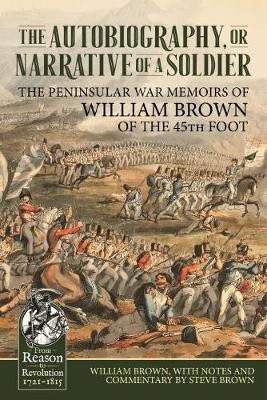The Autobiography or Narrative of a Soldier(English, Hardcover, Brown William)
Quick Overview
Product Price Comparison
William Brown's autobiography is a unique historical document, since he is the only memoirist to have come to light from the ranks of the 45th (1st Nottinghamshire) Regiment of Foot for the period of the Peninsula War - a regiment that was one of Wellington's longest-serving and most valiant in that turbulent era, a proud member of Sir Thomas Picton's 'Fighting' Third Division. William was born in Kilmarnock in 1788, the son of a poor cobbler, but seems to have been given a good education since the narrative is clear and lively, with many learned literary references. Like many young men, William Brown originally volunteered into the militia, Britain's second-line army intended for home defence only. And like a goodly percentage of these young men, he found that the life more-or-less agreed with him, and willingly took the bounty on offer to volunteer into the regular army a few weeks after Wellington's victory at Talavera.In the next five years he served at Busaco, Ciudad Rodrigo, Badajoz, Salamanca, Madrid, Vittoria, Orthez, and Toulouse, and his descriptions of these actions provide worthy additions to our knowledge of these great battles.William seems to have been generally a reliable soldier, often 'on command' doing ancillary regimental service involving a degree of trust, including service as an officer's batman. His outrage at the antics of his fellow-soldiers in the sack of Ciudad Rodrigo and Badajoz is palpable. Nonetheless, he occasionally seems to have slipped into questionable behaviour and comes across in the text as a bit of a 'likeable rogue'. His romantic pursuits also get plenty of coverage in the text.William's pen-portraits of commanders such as Picton, Kempt, Pakenham, and Brisbane are revealing, and he was not slow in criticising his senior battalion officers or their actions; nor indeed is the Duke of Wellington above William's barbed criticism.Maps are provided to allow the reader to understand the route travelled within Portugal and Spain by William and the 45th Regiment in those turbulent years, and the whole text is annotated by historian Steve Brown, an expert on the 45th and its deeds in the Napoleonic era.


